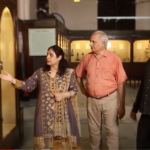Claims of victory on either side of the border notwithstanding, the 1965 war ended with a ceasefire and a stalemate – but it damaged the India-Pakistan relationship horribly
As India and Pakistan celebrate their respective victories following the 1965 war fifty years ago and Pakistan celebrates Defence Day on September 6, it is important to view history with a bipartisan lens and understand its long-term repercussions.
As with all other conflicts, it is difficult to establish exactly what happened. Governments and militaries on both sides are guilty of gross exaggerations and large-scale obfuscations.
Pakistan Army regulars from the Azad Kashmir Regiment crossed the Pir Panjal Range into Gulmarg, Uri and Baramulla in the first week of August 1965. They were supposed to assist an uprising against India, followed by direct combat (Amin, 2000). The thinking was that India would neither counter-attack nor involve itself in a full-scale war, and that Kashmir would be “liberated” (Matinuddin, 2007).
General Akhtar Hussain Malik, who led Operation Gibraltar as the plan was code-named, said later that the intention was “to defreeze the Kashmir problem, weaken Indian resolve, and bring India to the conference table without provoking general war” (Abbas, 2004).
Muhammad Musa, Pakistan’s Chief of Army Staff, was so sure of success of a limited war that he did not even inform Air Marshal Nur Khan who headed the Pakistan Air Force about his plans ahead of time (PTI, 2005).
What followed was a tale of incompetence and missed opportunities on both sides. Indian intelligence did not learn about the infiltration until it was complete. It took the Indian Army ten more days to finally respond with a counterattack on August 15, 1965. The Indian Army made rapid initial gains but by the end of August, there was a stalemate.
Pakistan responded with Operation Grand Slam on September 1, 1965, in an attempt to capture the strategically important Akhnoor town. Its initial success was reversed when Major Gen. Akhtar Hussain Malik was replaced with Gen. Yahya Khan.
Then Foreign Minister Zulfikar Ali Bhutto later said: “Had General Akhtar Malik not been stopped in the Chamb-Jaurian Sector, the Indian forces in Kashmir would have suffered serious reverses, but Ayub Khan wanted to make his favorite, General Yahya Khan, a hero” (quoted in Abbas, 2004).
Each side made some gains. The Pakistan Air Force dominated in the skies (Fricker, 1969. The Indian side turned the tables on the superior Pakistani Armoured divisions (Heginbotham and Wriggins, 1971). By the end of the war India captured at least 700 square miles of Pakistani territory — 1,500 according to India. Pakistan captured about 220 square miles of Indian territory — 250 according to Pakistan (Time, 1965).
The war ended with the Tashkent Agreement of September 22, 1965. Both sides returned all territory taken, rendering useless the sacrifices of those who fell during the conflict. India lost an estimated 3,000 men, Pakistan about 3,800.
Although the war itself resulted in a stalemate that both sides claim as victory, what we are left to deal with is its aftermath.
Pakistani analysts, military and civilian, were critical of how the war was planned and conducted. The “sane, philosophical and political critical thinking” was missing in Pakistan, commented General Tariq Majid (quoted in Khan, 2012). The general consensus was that the war was a complete failure (Time, 1965).
In India, there was a significant though short-lived criticism of the intelligence agencies’ failure in anticipating the cross-border infiltration. Prime Minister Lal Bahadur Shastri’s death diverted attention momentarily, but analysts and the military brass in India were angry at the ceasefire declaration at a time when 85 per cent of the Indian ammunition was unused as compared to only 20 per cent of what was left on the Pakistani side. India was left with twice as many serviceable tanks on the border with Pakistan (Black, 2005).
Major powers criticized Pakistan for the adventure. The U.S. with whom Pakistan had a defence pact, cut off military supplies to Pakistan, accusing it of starting the war.
Another effect of the war was the increase in Pakistan’s defence spending that rose from 4.82 of the GDP in 1964 to 9.86 per cent by 1966, with disastrous consequences for the economy. GDP per capita growth shrank from 7 per cent in 1965 to 2.6 in 1967. By 1970-71, defence spending was 55.66 per cent of government expenditure (Khan, 2012).
In the celebrations and recriminations the significant human cost of the war went largely unnoticed. Apart from the obvious death and destruction in the border areas, diplomatic relations between the two countries nosedived.
Almost overnight, both sides imposed draconian visa restrictions. Transport of goods, that was quite free before the war dried up and mutual trade dropped significantly after the war. Indian films, very popular across the border, were banned from being screened in Pakistan.
The most unfortunate aspect of the 1965 war was that it instituted Pakistan as the enemy number one in India and vice versa. Despite the much smaller scale of violence than during the 1947 partition, the 1965 war caused far more damage to the mutual relationship and locked South Asia into a cauldron of hate that remains on the boil.
In order to move away from the hostilities, both countries need to reconsider their Kashmir policy. Pakistan must realize that Kashmir cannot be won militarily. India must realize that 300,000 Armymen deployed in the Valley, and a terrible human rights record, will not succeed in extinguishing the Kashmiris’ demand for freedom (Azaadi).
In the long run, there is no justification for the economic, military and above all the moral cost of the operations in Kashmir. Dialogue leading to some form of autonomy or plebiscite is the only way forward.
None of this is possible, unless we, the people demand common sense from our leaders. We need to stand up and be counted if we are to live in peace.
References:
Time (1965, Oct. 1): Silent Guns, Wary Combatants,
Fricker, John (1969): “Pakistan’s Air Power”, Flight International magazine
Ibid (1979): Battle for Pakistan: The Air War of 1965, Ian Allan
Heginbotham, Stanley J. and Wriggins, William Howard (1971): India and Japan: The Emerging Balance of Power in Asia, Columbia University East Asian Institute
Amin, Major Retd. Agha Humayun (2000, September): “Grand Slam — A Battle of Lost Opportunities“, Defence Journal of Pakistan
Abbas, Hassan (2004): Pakistan’s Drift Into Extremism: Allah, the Army, and America’s War on Terror, Routledge
Iqbal, Pervaiz (2004): The Armed Forces of Pakistan, Allen & Unwin
PTI (2005, Sep 6): “A word from Pak: 1965 was ‘wrong’“, – Air Marshal Nur Khan, The Times of India
Wolpert, Stanley (2005): India, Berkeley: University of California Press
Black, Jeremy (2005): War in the Modern World since 1815, Rowman & Littlefield
Matinuddin, Lt. Gen. Rtd. Kamal (2007, Sept 30): “Operation Gibraltar revisited“, The News International, Pakistan
Khan, Feroz Hassan (2012): Eating Grass: the Making of the Pakistani Bomb, Stanford University Press
Samir Gupta is an IT professional, development activist and peace activist based in Ghaziabad, India. He also works in the field of primary education for underprivileged children. Email: [email protected]














Great article. Well researched and very balanced. And to the point. The generations that have gone by have failed us. The current set of leaders are as shallow and jingoistic so they continue to fail us. Not sure how many generations will suffer before the inevitable is realized – we’re one people, of one land, of same cultural and linguistic histories. It is ridiculous to pretend otherwise.
Hello Mr Samir Gupta,
Pakistan Army is Hands in Gloves with Terrorism…There motto will go on even after the Kashmir problem is resolved. Immediately, after the creation of that state, they attacked India or for that matter Kashmir. After The state was created their only Motto has been to go against India
As long as they allow their Military to dictate terms who in turn are partners with terrorism, the only hope is their civil society who has to understand and perhaps they do to retaliate this kind of arrangement and work hard by raising their voices to bring a proper democratic society in place. As of now it can be called a fractured democratic society.
As a result therefore, neither diplomatic nor political dialogue can take place because as it has been tried and tested before, as anything of that sort happens, soon their ISI, Military or their terrorist get into action with their evil activities so that the process is derailed.
There is no point going for a political dialogue with their democratic government because they do not call the shots.And, Jammu and Kashmir will not be that much of an issue if the terrorism stops…Now, since we as a majority Hindu nation do not export terrorist neither do we have any intentions to capture any other country’s territories but, only to defend our own. I wish our VHP or Bajrang dal could do something to produce our terrorists then probably we would remove our Army from there. And, mind you that Kashmir is a border state…So, we have Armies every where at our Indian borders therefore,Jammu & Kashmir is no exception.
About the Human Rights violation that people from different segments propose is, that it is nearly 90 days that Burhan Wani’s killing. It is only a small segment of people from only certain districts of J&K who have been protesting on killing of a terrorist. Although that small segment have been protesting not peacefully but, by violent means. In retaliation our forces have been restraining to the best of their abilities and only about close to 100 people have been killed which is sad as after All they are our own countrymen. This is just not for Kashmir, if this sort of retaliation had happened else where in our country even they had met with the same fate. Do not forget the naxalite movement in Bengal.
I do Agree that platforms like “AMAN KI ASHA” is a hope to make people of our countries understand to prevent exaggerated propaganda on both sides but at the same time it cannot be ignored that one of our two countries is more into supplying terrorist activities!!!! And that their democratic government is just a puppet in the hands of the other three State machineries. And only the people of that country can defeat this sort of set up…We understand that the citizens of that country are lovely people who are good looking, warm and kind hearted.
With Warm Regards
Animesh Chakraborty